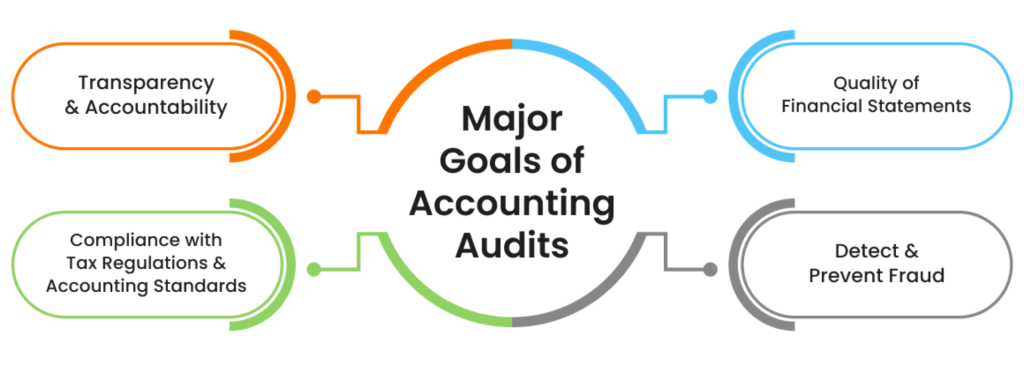Info@capitalvarsity.com
tel:- 011-41424320, 8851495336

Major Auditing Topics in Accounting 2025: A Guide by Capital Varsity
In the ever-evolving world of accounting, auditing remains one of the most essential pillars of financial transparency and compliance. With the increasing complexities of financial reporting, taxation, and regulatory compliance in 2025, understanding the latest auditing topics has become crucial for accounting professionals and students alike. At Capital Varsity, our mission is to prepare the next generation of financial leaders by focusing on real-world skills, updated curriculum, and hands-on training.
This comprehensive guide explores the major auditing topics in accounting that every learner must grasp to stay relevant and job-ready in 2025 and beyond.
1. Introduction to Auditing
Auditing is the process of evaluating financial records to ensure accuracy, legality, and fairness. It involves the independent examination of books, accounts, statutory records, and documents of an organization to ensure that financial statements present a true and fair view.
Key Concepts:
- Definition and objectives of auditing
- Need and importance in business
- Relationship between auditor and client
2. Types of Audits
Different businesses require different audit approaches. In 2025, audit processes are becoming more automated and risk-focused.
Popular Types Include:
- Statutory Audit
- Internal Audit
- Tax Audit
- Cost Audit
- Management Audit
- Forensic Audit
Capital Varsity covers all types with case studies and real-time examples to build practical understanding.
3. Auditing Standards (SAs)
Understanding and applying the correct auditing standards is essential in professional practice. These standards ensure uniformity, quality, and credibility in audits.
Focus Areas:
- Latest changes in Indian SAs and IFAC guidelines
- Audit documentation and evidence
Code of Ethics for auditors
4. Audit Planning and Risk Assessment
Every audit begins with planning. In 2025, auditors are expected to use data analytics and AI tools during the risk assessment phase.
Included in the syllabus at Capital Varsity:
- Audit programme development
- Understanding client environment
Identifying risk areas and materiality levels
5. Vouching and Verification
These are the core techniques used in checking the authenticity of transactions and assets.
Topics Covered:
- Vouching of cash transactions, purchases, and sales
- Verification of assets like fixed assets, inventory, investments
Differences between vouching and verification
6. Internal Control and Internal Check
These systems are essential to reduce errors and fraud in accounting. With increased digitization in 2025, auditors need to understand internal controls within software systems like Tally, SAP, or ERP.
Learn at Capital Varsity:
- Components of a good internal control system
- Internal check system in different departments
- Role of auditor in evaluating internal control
- Components of a good internal control system
7. Audit Evidence and Working Papers
Modern audits require digital audit trails and cloud-based documentation. Students must know how to collect, evaluate, and preserve audit evidence.
Key Learning Points:
- Types of audit evidence
- Audit working papers preparation
Role of technology in audit documentation
8. Errors and Frauds
Understanding the nature and detection of errors and frauds is crucial. In 2025, forensic audits and data analytics are being used more frequently to track suspicious activity.
Capital Varsity emphasizes:
- Classification of errors (omission, commission, principle)
- Types of frauds and red flags
Auditor’s responsibility in fraud detection
9. Audit Report and Auditor's Opinion
An auditor’s report is a critical document that communicates findings to stakeholders. Knowing how to draft and interpret audit reports is a must.
Coverage Includes:
- Types of audit opinions: unqualified, qualified, adverse, disclaimer
- Format of audit reports
Legal implications of audit reports
10. Company Audit under Companies Act 2013
Corporate audits are governed by strict laws and procedures.
In-depth topics include:
- Appointment, qualifications, and disqualification of auditors
- Auditor’s rights, duties, and powers
- Audit of share capital, reserves, dividends, and managerial remuneration
- Appointment, qualifications, and disqualification of auditors
11. Tax Audit (Section 44AB of Income Tax Act)
With frequent changes in tax regulations, accountants must be well-versed with the provisions of tax audit.
Taught in practical format:
- Applicability and due dates
- Forms 3CA, 3CB, and 3CD
Clauses and annexures in tax audit reports
12. Recent Trends in Auditing: Tech-Driven Audits
Capital Varsity stays updated with technology trends and trains students in:
- Audit automation tools
- CAATs (Computer Assisted Audit Techniques)
Use of Excel, ACL, and data analysis in audits
13. Ethical Issues and Auditor Independence
With financial scandals rising globally, auditor independence and ethical conduct are more important than ever.
Important discussions include:
- Code of conduct by ICAI
- Conflict of interest management
Threats to auditor independence
Capital Varsity: Shaping Career-Ready Auditors
Capital Varsity is not just an institute — it’s a career-launching platform for finance and accounting professionals. All auditing topics mentioned above are taught through:
- Classroom sessions with expert auditors
- Live case studies and documentation samples
- Workshops on audit software and Excel tools
- Mock audit report writing and presentations
Students walk out with confidence, certification, and the skills to work in CA firms, MNCs, or even as freelance auditors.
Final Thoughts
Auditing in 2025 demands both technical knowledge and practical skills. With regulatory frameworks evolving and digital audits becoming the norm, staying ahead in the auditing profession requires proactive learning. Capital Varsity ensures that students are future-ready through a rich, practical, and industry-relevant curriculum.
Whether you’re a commerce graduate, a working accountant, or someone planning to enter the audit field, Capital Varsity’s auditing training can give your career the boost it needs.
For more information, visit india.capitalvarsity.com or contact +91 88514 95336 to book a counseling session today.
